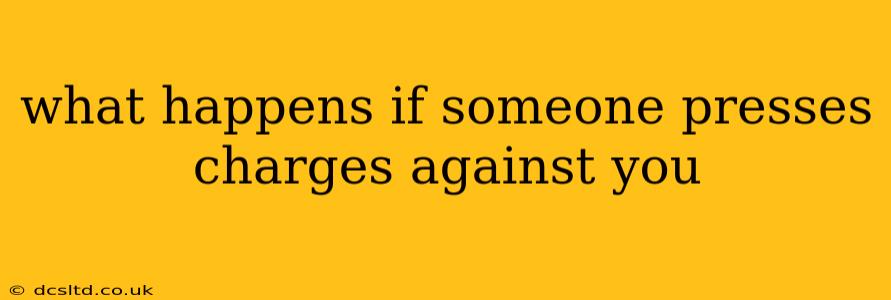What Happens If Someone Presses Charges Against You?
Facing criminal charges is a serious matter, filled with complexities that can be daunting to navigate. Understanding the process is crucial, whether you're the accused or someone considering pressing charges. This guide will break down the potential steps involved when someone presses charges. Remember, this is general information, and specific procedures can vary significantly depending on the location, the nature of the crime, and other factors. It's always best to seek legal counsel for personalized advice.
What Does "Pressing Charges" Actually Mean?
"Pressing charges" isn't a simple act of filing a complaint. It usually involves a formal process where a victim or witness reports a crime to law enforcement. The police then investigate the allegations. They gather evidence, interview witnesses, and decide whether there's enough probable cause to arrest the accused and bring charges before a court. The prosecutor, representing the state or government, ultimately decides whether to formally file charges. The victim's wishes influence the process, but the prosecutor has the final say.
What Happens After Charges Are Filed?
Once charges are filed, the accused is officially notified (usually through an arrest or summons). The process then generally proceeds as follows:
- Arraignment: The accused appears in court, is informed of the charges, and enters a plea (guilty, not guilty, or no contest).
- Pre-trial Proceedings: This stage involves various activities, including evidence disclosure, motions, plea bargaining negotiations, and hearings.
- Trial (if plea is not guilty): If a plea agreement isn't reached, a trial takes place where evidence is presented, witnesses testify, and a judge or jury determines guilt or innocence.
- Sentencing (if guilty): If convicted, the court imposes a sentence, which can range from probation to imprisonment, fines, or other penalties.
What if I'm the Victim and Want to Press Charges?
If you're a victim of a crime, you should report the incident to the police immediately. Provide as much detail as possible, including dates, times, locations, and any witnesses. The police will conduct an investigation. While your desire to press charges is important, remember that the decision to prosecute rests with the prosecutor's office, which evaluates the strength of the evidence.
What if I Don't Want to Press Charges, But the Police Still Investigate?
Even if you don't want to pursue charges, the police may still investigate, especially if the crime is serious or involves public safety. The prosecutor may decide to proceed with the case based on the evidence, regardless of your personal feelings.
What are the potential consequences of false accusations?
Making false accusations is a serious offense and can carry significant legal repercussions, including criminal charges such as perjury or filing a false police report. These charges can lead to fines, imprisonment, and a criminal record, severely impacting one's reputation and future opportunities.
Can I drop charges after they've been filed?
Whether you can drop charges depends heavily on the specific circumstances and jurisdiction. In some cases, the victim may be able to withdraw their statement or request that the charges be dismissed, but the prosecutor retains ultimate authority. The seriousness of the crime will also play a role in this decision.
How Can I Find a Lawyer?
If you are facing criminal charges, it is crucial to seek legal counsel immediately. You can find a lawyer through online legal directories, bar associations, or referrals from trusted sources. Don't hesitate; your legal rights are at stake.
This information is for general knowledge and should not be considered legal advice. The specifics of any criminal case are unique and require consultation with a qualified legal professional.
